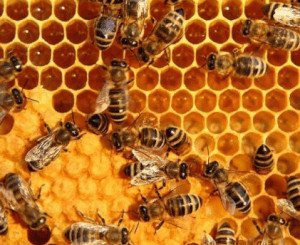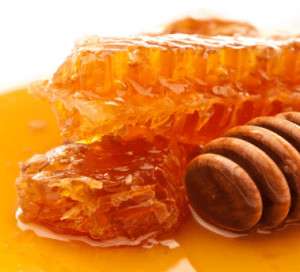Top 10 Restorative Health Benefits Of Honey

- How Is Honey Made?
- Raw Honey vs. Processed Honey
- Organic Honey vs. Regular Honey
- Regular Honey
- Raw Organic Honey
- Organic Honey
- Top 10 Health Benefits Of Honey
- 1. Honey For Weight Loss Explained
- 2. Honey For Antioxidant Benefits Explained
- 3. Does Honey Help With Sleep?
- 4. Can Honey Improve Allergies?
- 5. Honey: The Natural Cough Syrup
- 6. Honey For Burn And Wound Healing Explained
- 7. Honey For Diabetes Explained
- 8. Honey For Healthier Skin Explained
- 9. Honey For Healthier Hair Explained
- 10. Honey For Lowering Blood Pressure Explained
- Conclusion
Honey! We all know it and we all love it. But besides having a sweet taste that we tend to enjoy with teas, sweet treats, fruits, breakfasts and even savory dishes, it also has a tremendous amount of healing benefits.
Honey has been linked to a wide range of benefits from anticancer potential to lowering cholesterol. Sure, as with anything in life, there is a small risk of danger from honey. But this really only applies to infants and the sickness of infant botulism, which is caused by a neurotoxin created by clostridium botulinum. So as long as you avoid giving honey to babies under a year old, you can proceed with using honey to reap its many, many benefits.
Honey is popular all around the world for its immense health advantages as well as its delicious taste. In fact, the use of honey by humans is as old as history itself. Cave paintings found in Valencia dating back to around 8000 years ago illustrate primitive people harvesting it from a hive. Farming honey is also very beneficial to the environment. It’s a lot better for you and the earth compared to artificial sweeteners and processed foods consumed so often nowadays.
But what exactly can honey be used to treat and what is the best way to utilize it? I’ll be diving into this in the article and try to give you a few tips and interesting facts about the health benefits of sweet substance.
How Is Honey Made?

Bees make honey.
As many know, bees – nature’s little workers- make honey. The genus of honeybees known for creating honey are known as Apis. Apis bees commercially source the most popular honey in the world because it is sweet and healthy.
There are a lot of factors that can determine the taste and texture of honey like available plants ready for pollination and the genus of bee. This is why locally farmed honey changes in both flavor and texture depending on the geographical location of the farm.
Honey is made using the nectar of flowering plants before being saved inside the hive. The bees then regurgitate enzymes onto the pollen which help to break it down into a more liquid state. Through the process of water evaporation, the liquid becomes more viscous in nature and it is then stored in wax cells of the honeycomb (which also contains propolis), where it can last for an indefinite amount of time.
Much like us, the bees eat the honey as a source of food during the winter times. During spring and in periods of the summer harvest occurs.
Recently, scientists have said that we should be careful to limit the amount of honey we consume on a monthly basis. Ecological effects of eating too much honey may cause bees to die out. This is happening at more of a rapid rate these days. As Einstein warned a long time ago, when the humble bee goes extinct – our time is very limited. Which is why the National Honey Board is making such an effort to educate the public about honey and bees.
Raw Honey vs. Processed Honey

Raw Honey.
Technically, there is no real definition for ‘raw honey’ as of yet, which means that it’s quite easy for many brands to simply slap the words on their label and hope that consumers will buy it believing that it actually is raw honey.
Based on what I understand of the term ‘raw honey’, it refers to honey that has not been heated or filtered to remove the tiny particles of leftover pollen that may remain from the hive. In other words, it is honey directly packaged from the hive.
Many claim that these tiny bits of pollen have tremendous health benefits that could make the honey a little healthier.
However, I’m not sure exactly how much of a difference they really make and think that most brands of honey will still have similar health benefits.
Although, sourcing honey straight from the hive does sound like an ideal solution, you’ll have to do your research when it comes to finding a brand that’s truly unprocessed. I’ve taken to liking the brand Honest Raw Honey simply because that’s what it is.
If you’re interested in better understanding the quality of different types of honey, the USDA has a clear grading system to make sure that explains how quality is determined and what are acceptable scores.
Organic Honey vs. Regular Honey
So in order to understand the difference between these two forms of honey, we actually have to compare 3 different types of honey – which are all basically the same honey, just processed in three different ways.
Regular Honey
- Regular crops/fields/ forests which are possibly sprayed with pesticides or had synthetically fertilized lands
- Bees’ treated with antibiotics (such as Ciprofloxacin) and winter nourishment with sugar, or low-cost syrup (cane, corn, beet, rice, tapioca or fruit syrup to name a few)
- Hives made of non-organic materials, which may have pests, mice, spiders and will be cleaned with non-organic substances
- Extracted honey is pasteurized and filtered. This implies heating at high temperatures. This destroys enzymes and increases the potential level of toxins in the final product
- Contains additives
Raw Organic Honey
This honey is considered crude because it’s immediately taken out of the combs’ cells. It is not pure and may contain rough particles of pollen, dead bees, legs, wings, hunks of wax and other impurities. This is why it is often strained through a fine mesh. The only form of processing only requires to remove these more ‘immediate’ impurities. The following prerequisites are required to be classified as an organic honey farm:
- Respect to organic farming procedures (as per the regulations of the specific state or country)
- Not be heated above the normal temperature of the beehive which are 95 degrees F / 35 degrees C (if extraction implies heating)
- If desired strained to remove larger particles
- Not filtered or ultra filtrated (as this also implies overheating)
- No pasteurization
- No additive artificial substances or additives
- Stored in organic containers (light brown/amber glass jars)
Organic Honey
This usually means raw organic honey as heating is not allowed here as well above 95 degrees Fahrenheit or 35 degrees Celsius. To be organic, honey must:
- Follow good organic management, according to each country’s set of standards and conditions
- Processing done through gravitational settling and straining.
In short, organic and raw organic honey are basically the same thing. The assumed differences are just the result of marketing terms and general confusion. There is either organic (whether raw or not) or regular honey – that’s it.
Top 10 Health Benefits Of Honey
1. Honey For Weight Loss Explained

Honey For Weight Loss.
Losing weight can be a challenge for any of us who try. It’s important to remember that it’s a process that takes time and doesn’t happen overnight.
Losing weight does not necessarily have to mean starving yourself, completely cutting out carbs, etc. It’s a matter of making sure you eat the right food and ensure you get enough exercise.
But everyone is different and each diet has its own unique requirements. It’s best to take it step by step and day by day, and maybe even consult with a dietitian. That being said, the effect of honey for people watching their weight is amazing. It’s a natural sweetener which contains both glucose and fructose. When added to any diet, honey can boost energy levels and suppress hunger pangs.
Studies have shown that eating honey on a regular basis can help to lower triglycerides in our system. This will ultimately help speed up the metabolic processes and help shed weight. Triglycerides are a type of fat that occur in our blood after we eat carbohydrates and fatty foods.
Triglycerides burn off in between meals. If our calorie intake is higher than what we burn, our body stops using triglycerides and we start gaining weight. Another study showed how honey reduces hunger. By adding a tablespoon of honey to their breakfast, women experienced reduced hunger cravings over the course of the day. They were also able to suppress their appetites for longer.
If you exercise enough and count those calories – you will be looking fitter and healthier in almost no time. Here’s to achieving that body you’ve always wanted by using honey for weight loss!
2. Honey For Antioxidant Benefits Explained

There are many Antioxidants in Honey.
When it comes to keeping our bodies healthy, nothing is more important than getting enough antioxidants into your system. Antioxidant properties are important for managing oxidative stress and preventing free-radical damage to vital tissues and organs. This occurs when oxygenated molecules are missing an electron. They ultimately try to ‘steal’ an electron from suitable compounds.
This starts a chain-reaction like effect. Each compound that loses an electron then goes on to find another electron from another compound or molecule and so on and so forth. Polyphenol, an antioxidant produced by honey, entraps free radicals.
By consuming honey, you are making it easier for your body to flush free radicals out before they cause any damage or cell degeneration.
Honey also contains another variety of antioxidants known as flavonoids, more specifically pinocembrin, pinostrobin and chrysin. These antioxidants actively induce a state known as apoptosis in certain cancer cells. This basically means that the cells kill themselves over time.
As you can see, getting enough antioxidants is important for your health. Due to this, more research is being done into using honey as treatment or prevention for certain forms of cancer. If you really want to maximize the health benefits of honey, try to use around 4 teaspoons a day. Add it to your tea or as part of a breakfast meal like oats or muesli etc. A spoonful of honey can help you and your immune system stay healthy.
3. Does Honey Help With Sleep?
Sleep is something that I think people leave out far too often when assessing their lifestyle or health and studies have shown that getting too little sleep on a regular basis has compounded damage on your body and can put you at risk of developing diseases or ailments such as hypertension, type 2 diabetes, obesity, general heart disease and even strokes.
So if you’re struggling to sleep at night – don’t run off to the chemist to get a tranquilizer (those are incredibly addictive and can really have negative effects on your health in the long-term). Rather, maximize the health benefits of honey and rather grab some honey add some to a nice warm cup of tea or simply eat a teaspoon of the stuff.
Firstly, by eating a little honey before we go to sleep, we can actively increase the amount of glycogen in our bodies which means we won’t be prompted to wake up in the middle of the night to go get a snack. But beyond that, honey does something quite amazing.
When we eat it before going to sleep, it creates a small spike in our insulin levels. The insulin is then converted into tryptophan which is a mood-altering essential amino acid that helps to induce sleep. But it doesn’t stop there! The tryptophan is then converted into serotonin which then becomes melatonin – the hormone responsible for making us sleep.
While we sleep, our bodies heal themselves and balance out hormone levels. We are then ready and prepared for the day ahead. Nothing feels better than waking up comfortably after a good night’s rest, so be sure to get your sleep and use honey instead of tranquillizers if you’re struggling. You’ll be grateful for making the holistic choice later – trust me.
4. Can Honey Improve Allergies?

Honey For Allergies?
Eating locally farmed honey is a known natural way to help curb your body’s sensitivities to certain pollen-based allergies. This is due to a process in our body known as immunotherapy and very similar in principle to the way in which vaccinations work.
Because the bees collect honey from various different species of plants around the area, when you eat it, you’re essentially dosing your system with a small amount of each of these plants’ pollen.
Over time as you eat more honey, your body learns to build up more of an immunity to these allergies and you become less sensitive to allergic reactions. But this can take some time – so it might be handy keeping some antihistamines on hand while you build up your immunity.
5. Honey: The Natural Cough Syrup

Have honey to soothe your throat during the cold winter months.
I’m quite sure we all know the feeling of a sore throat. And nothing is more annoying than not being able to speak properly or feeling pain every time you swallow something. We tend to get sore throats most commonly around the winter times when our bodies are most susceptible to infection. And some try drinking warm water or hot water to relieve this pain. But how can we use honey to treat a sore throat or throat infection?
Well, the answer couldn’t be anymore simple. It’s known to be as effective and healthier than over-the-counter cough medicines. It acts as a natural cough suppressant due to the rich antioxidants and vitamin content found in honey. They help clear out toxins, suppress mucous secretion and ease a cough. Royal jelly especially, which bees create for their own feeding, might even give your immune system an extra boost. As little as one or two teaspoons of honey before bedtime can work wonders on a sore throat and provide fast-acting relief as well as a speedy recovery.
So why not help yourself to a sweet treat and heal your sore throat at the same time! Throw out the dextromethorphan-filled cough medicine in your bathroom cabinet and reach for the honey instead. “Taking your medicine” has never been easier and tastier.
6. Honey For Burn And Wound Healing Explained
Honey’s health benefits weren’t just discovered now. Ancient Egyptians used honey to solve a whole bunch of different problems, one of them being skin wounds and burns.
It’s been shown to be extremely effective in healing wounds that become infected after surgery as well as treating partial-thickness burns. It’s also useful for individuals suffering from diabetic foot ulcers, making it a cheap and easy way to prevent the need for amputations later on. And people have had success with using it to help with psoriasis and herpes lesions, too.
But why is honey so good at healing burns and wounds? Researchers claim that this is due to both its antibacterial properties and its anti-inflammatory properties. It’s also able to nourish skin tissue, helping your skin cells heal more effectively and efficiently.
Manuka honey is a special type of honey that’s particularly good for treating burns. Manuka honey comes from Australia and New Zealand and is known for its anti-inflammatory and healing properties. It can also help heal tissue which has experienced damage because of an infection.
Buckwheat honey is another type of honey used for the purpose of treating damaged skin. It works by pulling moisture out of the damaged area and preventing a buildup of bacteria.
7. Honey For Diabetes Explained

Honey For Diabetes.
The health benefits of honey for diabetes go much further than many have long thought possible. Unlike many natural products, it doesn’t interfere with any medication that we may be taking to treat diabetes.
In fact, studies have shown that honey with a combination of cinnamon can actually aid certain forms of diabetes medication. The mixture can make them more effective at treating the illness overall.
It becomes a low-GI food when combined with cinnamon. Consuming it can lower the blood-sugar levels in your body.
By raising insulin levels and lowering hyperglycemia, you can actively manage your diabetes more effectively over time. So be sure to add both raw honey and cinnamon to your diet if you’re trying to cope with diabetes. Monitor your blood levels closely to see how your body reacts.
Manuka honey is often touted as a "superfood" — and some of the claims about its health benefits may not be as outlandish as they seem https://t.co/npT9v7Q3J1 pic.twitter.com/nI10bgw6RC
— CNN (@CNN) November 25, 2017
8. Honey For Healthier Skin Explained

Honey For Healthy Skin.
Cleopatra is easily one of the most famous beauties in history. But what were her beauty secrets and how did she achieve such history-defining beauty in a time before science? The answer is simple. Natural is always better, and one thing Cleopatra was famed for using was raw natural honey. By the bath load!
Honey is a potent, natural antibacterial agent which helps remove germs and bacteria on our skin’s surface. Germs and bacteria can lead to breakouts and the spread of acne. By blending a teaspoon of honey with half a teaspoon of cinnamon in your palm and gently rubbing it onto your skin, you can create a natural face mask.
This helps reduce inflammation on the skin’s surface and can lock moisture in whilst hydrating and nourishing your skin with a rich vitamin and mineral complex that can rarely be found in conventional products at a similar price as raw honey.
Be sure to leave the mask on for 15-20 minutes. Once the time has elapsed, rinse it off with lukewarm water. This will also help to remove dirt from your pores and get rid of trapped excess sebum oil.
However, it doesn’t only have to be used on your face. It has been used for centuries throughout history to help treat wounds, ulcers and internal sores. By blending a teaspoon of honey with 2-3 drops of eucalyptus oil you can create a pretty potent natural antibacterial remedy that can help to prevent the onset of infection and speed up the healing process.
This is definitely my go to when I’ve got a scratch or a minor cut and love how beneficial the mixture is for my skin and health in general, unlike many conventional, chemical-based antibacterial tinctures or disinfectants.
9. Honey For Healthier Hair Explained

How to get Healthier Skin using Honey.
Honey is one of the best natural products for your hair. It’s incredibly effective at hydrating, nourishing and treating a wide variety of hair types naturally and efficiently.
Firstly, honey is a natural humectant. This means that it absorbs the moisture from the air around it and locks it into your hair follicles. Your hair follicles will benefit by feeling stronger, softer and healthier throughout the day. It also creates a thin layer around the hair (with consistent use) that helps prevent damage from the elements as well as free radical damage.
Honey is also great for those who want a lighter shade of hair (or some minor highlights). Honey won’t put too much stress on their hair by using harmful chemicals. This helps lighten your hair naturally and gently. Unlike the unnatural color from DIY peroxide treatments, honey will leave a nice, natural shade. Definitely ideal for those light, bright summer locks!
The strong antibacterial and anti-fungal properties of honey also help keep the hair free of germs and bacteria that can cause inflammation or infection. Germs and bacteria are generally the main causes of issues like dandruff. So by eliminating the root cause of the issue, you can treat dandruff and scalp infections in their entirety and prevent them from returning.
The best way to implement honey in your hair care routine is also the easiest! Simply blend 5 teaspoons of raw honey with 3-4 drops of eucalyptus or lavender essential oil. Stir this mixture together until it becomes light and ‘runny’.
Then add it to your favorite bottle of natural shampoo and wash as per usual. You can also prevent the onset of hair loss by washing with this mixture 2-3 times a week.
10. Honey For Lowering Blood Pressure Explained

Add some honey to your day for lower blood pressure.
Around 67 million Americans suffer from hypertension, which can lead to stroke or heart attack. That’s quite a staggering number! Of course there are plenty of ways to reduce your blood pressure, such as exercising and watching what you eat. But if you’re one of those 67 million suffering from hypertension (or want to prevent yourself from becoming one of them), keep on reading.
Turns out that among its many benefits, honey can also help you lower your blood pressure. The antioxidants in honey have been linked to lower blood pressure in research using both animals and humans. Pretty cool!
So it’s an ever-important ingredient to add to your diet in order to lead a heart-healthy life. This wonderous effect of honey might be due to its oligosaccharides, a type of carb that can possess antioxidant qualities. This can help honey consumers lower their systolic blood pressure levels, and the effects can actually be seen pretty quickly.
Conclusion
If you haven’t already heard about the amazing health benefits of honey, then this is your wake up call!
Why keep throwing money down the drain on costly medications, tranquilizers, skin and hair care products that don’t work or come with a long list of side-effects which have an ultimately negative effect on your health?
When you spell it out logically – it simply doesn’t make any sense. So why not do your bit to help the bees and save the environment? By buying raw organic version for your skin, hair and general health needs you can do both. Be Eco-friendly and have healthy and low-cost home remedies.
The natural option is almost always the ideal choice when it comes to health care and personal care. You’d be fooling yourself if you think a conventional product can do more than this highly refined natural wonder product. We must recognize this superfood for all that it has to offer. And the shelf life is amazing- it’s one of the only foods that never expires!


